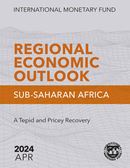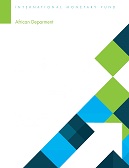This web page provides information in on the activities of the Office, views of the IMF staff, and the relations between Malawi and the IMF. Additional information can be found on Malawi and IMF country page, including official IMF reports and Executive Board documents in English that deal with Malawi.
At a Glance
- Current IMF membership: 190 countries
- Malawi joined the Fund in July 19, 1965; Article VIII (December 7, 1995)
- Total Quotas: 138.8 Million
- Outstanding Purchases and Loans (SDR): 333.32 million (December 31, 2023)
- Last Article IV Consultation: Published on December 20, 2021. (Country Report No. 21/269, December 13, 2021)
Office Activities
-
Launch of the October 2019 Sub Saharan Africa Regional Economic Outlook
Presentation at the Bingu International Conference Center
November 22, 2019
-
"Macroeconomic Developments in Malawi"
Presentation at the Economic Association of Malawi (ECAMA) 2019 Annual Conference
November 7, 2019
IMF's Work on Malawi
-
IMF Staff Completes Mission to Malawi
May 23, 2024
An IMF staff team led by Ms. Mika Saito visited Lilongwe from May 12 to 23, 2024 to conduct discussions on the First Review of the ECF-supported program. The program was approved by the IMF Executive Board on November 15, 2023.
-
Transcript of African Department April 2024 Press Briefing
April 19, 2024
Good morning and good afternoon and good evening for our viewers around the world. I am Tatiana Mossot with the IMF Communication department.
-
IMF Executive Board reviews the Staff-Monitored Program with Board Involvement
February 20, 2024
The Executive Board of the International Monetary Fund (IMF) completed the review of the policy on Staff-Monitored Programs with Board Involvement (PMB). This instrument helps member countries to establish a track record to access an IMF-supported program.
-
Malawi's Plan to Create a Stable and Sustainable Economy
February 2, 2024
Adherence to the authorities' macroeconomic adjustment and reform program would help Malawi overcome current and future challenges.
-
IMF Staff Concludes Visit to Malawi
January 26, 2024
An International Monetary Fund (IMF) staff team led by Ms. Mika Saito visited Malawi during January 22-26 as part of its regular engagement with the Malawian authorities and other stakeholders. The discussions focused on recent macroeconomic developments and the implementation of macroeconomic adjustment and reforms committed under the Extended Credit Facility (ECF) arrangement approved on November 15, 2023. Discussions were held in Lilongwe and Blantyre.
Fraudulent Scam Loan Application Forms Using the Name of the IMF
We would like to bring to the notice of the general public that several variants of financial scam documents purporting to be sanctioned by the International Monetary Fund (IMF) or authored by high ranking IMF officials are currently in circulation. Specifically, fake loan application forms on bogus official letterhead containing the IMF logo are in circulation in Malawi. The scam loan application forms instruct potential victims to complete and submit private information to the IMF, including personal bank details, identification numbers and other details to enable them to receive business loans. The contact information is always BOGUS and the scammers utilize unsuspecting individuals’ personal information for their fraudulent activities.For more information please see Fraudulent Scam Emails Using the Name of the IMF
Regional Economic Outlook for Sub-Saharan Africa
April 19, 2024

After four turbulent years, the outlook for sub-Saharan Africa is gradually improving. Growth will rise from 3.4 percent in 2023 to 3.8 percent in 2024, with nearly two thirds of countries anticipating higher growth. Economic recovery is expected to continue beyond this year, with growth projections reaching 4.0 percent in 2025. Additionally, inflation has almost halved, public debt ratios have broadly stabilized, and several countries have recently issued Eurobonds, ending a two-year hiatus from international markets. However, not all is favorable and risks to the outlook remain tilted to the downside. The funding squeeze persists as the region’s governments continue to grapple with financing shortages, high borrowing costs, and impending debt repayments. Amid the challenges, sub-Saharan African countries will need additional support from the international community to develop a more inclusive, sustainable, and prosperous future.
Read the Report
Departmental Papers on Africa




